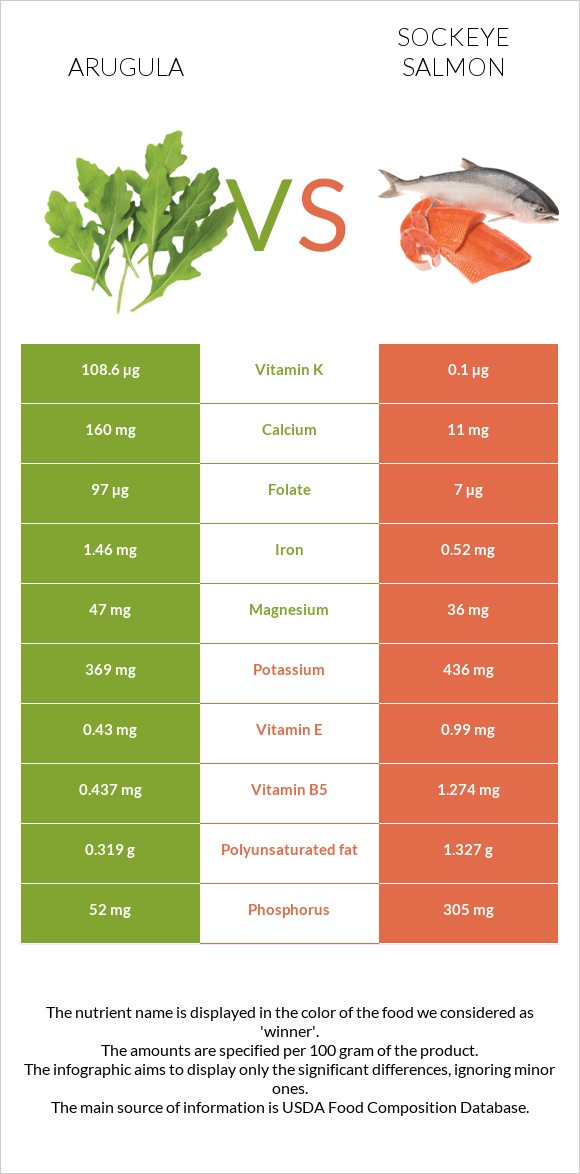Arugula vs. Sockeye salmon — In-Depth Nutrition Comparison
Compare
A recap on the differences between arugula and sockeye salmon
- Arugula is higher in vitamin K, vitamin A, and folate, yet sockeye salmon is higher in vitamin B12, vitamin D, selenium, vitamin B3, vitamin B6, and phosphorus.
- Sockeye salmon covers your daily vitamin B12 needs 186% more than arugula.
- Arugula contains 1086 times more vitamin K than sockeye salmon. While arugula contains 108.6µg of vitamin K, sockeye salmon contains only 0.1µg.
- The glycemic index of sockeye salmon is lower.
Food varieties used in this article are Arugula, raw and Fish, salmon, sockeye, cooked, dry heat.
Infographic

Infographic link
Mineral Comparison
Mineral comparison score is based on the number of minerals by which one or the other food is richer. The "coverage" charts below show how much of the daily needs can be covered by 300 grams of the food.
| Contains more MagnesiumMagnesium | +30.6% |
| Contains more CalciumCalcium | +1354.5% |
| Contains more IronIron | +180.8% |
| Contains less SodiumSodium | -70.7% |
| Contains more ManganeseManganese | +2369.2% |
| Contains more PotassiumPotassium | +18.2% |
| Contains more ZincZinc | +17% |
| Contains more PhosphorusPhosphorus | +486.5% |
| Contains more SeleniumSelenium | +11733.3% |
Vitamin Comparison
Vitamin comparison score is based on the number of vitamins by which one or the other food is richer. The "coverage" charts below show how much of the daily needs can be covered by 300 grams of the food.
| Contains more Vitamin CVitamin C | +∞% |
| Contains more Vitamin AVitamin A | +105.2% |
| Contains more Vitamin KVitamin K | +108500% |
| Contains more FolateFolate | +1285.7% |
| Contains more Vitamin EVitamin E | +130.2% |
| Contains more Vitamin DVitamin D | +∞% |
| Contains more Vitamin B1Vitamin B1 | +256.8% |
| Contains more Vitamin B2Vitamin B2 | +186% |
| Contains more Vitamin B3Vitamin B3 | +3219% |
| Contains more Vitamin B5Vitamin B5 | +191.5% |
| Contains more Vitamin B6Vitamin B6 | +1032.9% |
| Contains more Vitamin B12Vitamin B12 | +∞% |
All nutrients comparison - raw data values
| Nutrient |  |
 |
DV% diff. |
| Vitamin B12 | 0µg | 4.47µg | 186% |
| Vitamin K | 108.6µg | 0.1µg | 90% |
| Vitamin D | 0 IU | 670 IU | 84% |
| Vitamin D | 0µg | 16.7µg | 84% |
| Selenium | 0.3µg | 35.5µg | 64% |
| Vitamin B3 | 0.305mg | 10.123mg | 61% |
| Vitamin B6 | 0.073mg | 0.827mg | 58% |
| Protein | 2.58g | 26.48g | 48% |
| Phosphorus | 52mg | 305mg | 36% |
| Folate | 97µg | 7µg | 23% |
| Cholesterol | 0mg | 61mg | 20% |
| Choline | 15.3mg | 112.6mg | 18% |
| Vitamin C | 15mg | 0mg | 17% |
| Vitamin B5 | 0.437mg | 1.274mg | 17% |
| Calcium | 160mg | 11mg | 15% |
| Manganese | 0.321mg | 0.013mg | 13% |
| Iron | 1.46mg | 0.52mg | 12% |
| Vitamin B2 | 0.086mg | 0.246mg | 12% |
| Vitamin B1 | 0.044mg | 0.157mg | 9% |
| Fats | 0.66g | 5.57g | 8% |
| Calories | 25kcal | 156kcal | 7% |
| Vitamin A | 119µg | 58µg | 7% |
| Polyunsaturated fat | 0.319g | 1.327g | 7% |
| Fiber | 1.6g | 0g | 6% |
| Monounsaturated fat | 0.049g | 1.864g | 5% |
| Vitamin E | 0.43mg | 0.99mg | 4% |
| Saturated fat | 0.086g | 0.969g | 4% |
| Magnesium | 47mg | 36mg | 3% |
| Sodium | 27mg | 92mg | 3% |
| Potassium | 369mg | 436mg | 2% |
| Carbs | 3.65g | 0g | 1% |
| Zinc | 0.47mg | 0.55mg | 1% |
| Net carbs | 2.05g | 0g | N/A |
| Sugar | 2.05g | 0g | N/A |
| Copper | 0.076mg | 0.076mg | 0% |
| Trans fat | 0g | 0.023g | N/A |
| Tryptophan | 0.335mg | 0% | |
| Threonine | 1.247mg | 0% | |
| Isoleucine | 1.274mg | 0% | |
| Leucine | 2.185mg | 0% | |
| Lysine | 2.574mg | 0% | |
| Methionine | 0.858mg | 0% | |
| Phenylalanine | 1.086mg | 0% | |
| Valine | 1.461mg | 0% | |
| Histidine | 0.711mg | 0% | |
| Omega-3 - EPA | 0g | 0.299g | N/A |
| Omega-3 - DHA | 0g | 0.56g | N/A |
| Omega-3 - DPA | 0g | 0.093g | N/A |
| Omega-6 - Eicosadienoic acid | 0.019g | N/A |
Macronutrient Comparison
Macronutrient breakdown side-by-side comparison
Protein:
2.58 g
Fats:
0.66 g
Carbs:
3.65 g
Water:
91.71 g
Other:
1.4 g
Protein:
26.48 g
Fats:
5.57 g
Carbs:
0 g
Water:
67.33 g
Other:
0.62 g
| Contains more CarbsCarbs | +∞% |
| Contains more WaterWater | +36.2% |
| Contains more OtherOther | +125.8% |
| Contains more ProteinProtein | +926.4% |
| Contains more FatsFats | +743.9% |
Fat Type Comparison
Fat type breakdown side-by-side comparison
Saturated fat:
Sat. Fat
0.086 g
Monounsaturated fat:
Mono. Fat
0.049 g
Polyunsaturated fat:
Poly. Fat
0.319 g
Saturated fat:
Sat. Fat
0.969 g
Monounsaturated fat:
Mono. Fat
1.864 g
Polyunsaturated fat:
Poly. Fat
1.327 g
| Contains less Sat. FatSaturated fat | -91.1% |
| Contains more Mono. FatMonounsaturated fat | +3704.1% |
| Contains more Poly. FatPolyunsaturated fat | +316% |





